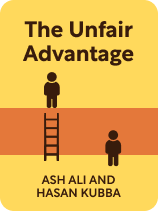

This article is an excerpt from the Shortform book guide to "The Unfair Advantage" by Ash Ali and Hasan Kubba. Shortform has the world's best summaries and analyses of books you should be reading.
Like this article? Sign up for a free trial here .
How important are location and timing in business? Are they a built-in advantage for you?
If you’re in the right place at the right time, you have a leg up over the competition. Location and timing are unfair advantages identified in the book The Unfair Advantage by entrepreneurs Ash Ali and Hasan Kubba. The authors discuss potential drawbacks of good location and timing, how to know if location and timing are your unfair advantage in particular, and how to improve and make the most of your location and timing.
Let’s take a closer look at this unfair advantage.
Location and Timing
According to Ali and Kubba, location and timing in business—being in the best position or place at the optimal moment—determine your startup’s success.
Location includes your city, neighborhood, business site, and online presence. If you live in an area with a lot of talented workers, eager investors, quality internet connection, and reliable transportation, you can potentially tap into those resources to facilitate business growth. Also, if your business is in a safe, easily accessible, and highly visible area, you’ll find it easier to attract customers. Further, your business prospects improve significantly if you have a clear, user-friendly website that appears frequently in organic search results.
| The Post-Location Business World If you need a physical location for business, location absolutely affects your ability to attract customers, as Ali and Kubba say. However, the move toward digital business activity is arguably making location less important. In June 2020, only 26% of people were working on their business premises; 42% were remote, and 33% were not working. About 16% of all retail sales occur online, and some analysts predict 95% of all retail sales will happen online by 2040. So, it might make more sense for you to forego a physical business location altogether. If you choose this route, having a professional, easy-to-navigate website is non-negotiable, as 88% of consumers research product information before they make a purchase online or in a store. |
Timing refers to how closely your business idea coincides with customers’ changing interests, which are shaped by cultural and technological advances. For example, home office design solutions surged in popularity only after the number of remote workers rose during the Covid-19 pandemic. As Ali and Kubba explain, getting your timing right is critical. If you launch too soon, you’ll likely have to work extra hard to increase awareness of your product and convince people of its benefits, potentially incurring high marketing costs in the process. If you launch too late, the market may be saturated with established competitors. Ideally, the authors say, you should aim to capitalize on a growing, long-term trend.
(Shortform note: How much does timing matter? In one study of 200 companies, timing accounted for 42% of the difference between business success and failure. One way to gauge timing, experts say, is studying relevant websites and blogs. If a trend is developing, people will likely be talking about it in a few places online. Also, research the current market to see if there’s a current need or desire for your business idea. For example, if you’re starting a small brick-and-mortar business, local business trends—such as whether other small businesses or startups are succeeding—will help you determine if the environment is ripe for your business venture.)
Potential Drawbacks of Good Location and Timing
Are there drawbacks to having good location and timing? Although living in a good neighborhood, securing a desirable business location, and building a robust online presence can support growth, it can also be expensive, according to Ali and Kubba.
(Shortform note: Some argue that a good “location” doesn’t have to be expensive thanks to the modern convenience of the internet. In The $100 Startup, Chris Guillebeau says you can now launch a business for as little as $100, with only a sound business idea, a website, a way to process payments, and basic marketing.)
Further, Ali and Kubba say that if a good location and timing cause you to achieve success early in your business journey, you might become reckless, arrogant, and delude yourself into thinking you’re more capable than you actually are, causing you to stop learning.
(Shortform note: Many business leaders acknowledge that rapid success can lead to complacency, as Ali and Kubba warn. According to scientists, motivation is the number one reason people succeed—beating self-confidence, initial resources, and luck—so complacency can derail your business growth. One way to overcome complacency is to set aside 10 minutes a day to reflect on what you accomplished and how you can improve. Write down what actions you’re going to take, and ask people to hold you accountable.)
How to Know If Location and Timing Are Your Unfair Advantage
To assess whether location and timing are unfair advantages for you, Ali and Kubba say to consider whether your business sites—both brick and mortar and online—are accessible and welcoming to customers. Also, evaluate whether your business idea is merely tapping into a fleeting trend, or if you’re latching onto more sustained, long-term interest that can carry your business into the future.
How to Improve Your Location and Timing
If you think you fall short in location and timing, here are steps you can take to develop in this category:
- Consider relocating to a city or business region that has the customers and resources you need.
- Boost your website’s ranking through search engine optimization (SEO).
(Shortform note: SEO is free but incredibly time-consuming if you do it yourself. If you opt to pay someone to handle SEO for you, cheap providers generally cost between $500 and $3,000 per month while high-end providers range from $15,000 to $30,000 per month. Is the expense worth it? According to research, 70% of businesses say SEO generates more sales compared to pay-per-click advertising, so this step will probably pay off in terms of increased visibility (and sales), just as Ali and Kubba say.)
| Assess Your Business’s Availability According to Byron Sharp in How Brands Grow, even if your business is welcoming and located in an accessible area, customers will ignore it completely if they aren’t looking for it or don’t recognize it. Therefore, you should not only assess your brand’s “physical availability,” as Ali and Kubba recommend, but also its “mental availability”—how recognizable it is to customers. To increase your brand’s mental availability, one step Sharp suggests is to advertise regularly, which will create memories that customers draw upon when making buying decisions. If you’re considering relocating, per Ali and Kubba’s suggestion, see if you can expand instead and keep both locations. Sharp contends that expanding into an additional location would pay for itself if you pull it off correctly, as the additional store will increase your brand’s physical and mental availability. To execute a successful expansion, be sure to devote extra attention to making your brand highly visible in the new location—for example, by using bold signage in high traffic areas. This will help you grab people’s attention and lure them into your store. |
| Create Your Own Trend Instead of Waiting Instead of waiting for the right trend, as Ali and Kubba suggest, many argue that it’s more profitable for you to start your own trend by innovating in a space that’s never before been explored. In Blue Ocean Strategy, W. Chan Kim and Renée Mauborgne say it’s best to operate in an uncontested market—a “blue ocean”—rather than an intensely competitive “red ocean” market filled with ruthless competitors. One way to get this edge is to design a product that’s clearly superior to the competition and benefits customers in a new way. For example, the company Ring did this by creating doorbells with security features like video cameras and motion detectors, allowing customers to know when someone is at their home even when they’re not there. |

———End of Preview———
Like what you just read? Read the rest of the world's best book summary and analysis of Ash Ali and Hasan Kubba's "The Unfair Advantage" at Shortform .
Here's what you'll find in our full The Unfair Advantage summary :
- The guidebook you need if you're planning to start a business
- How to find and use your unfair advantages (everybody has some)
- The steps you must take to achieve startup success






